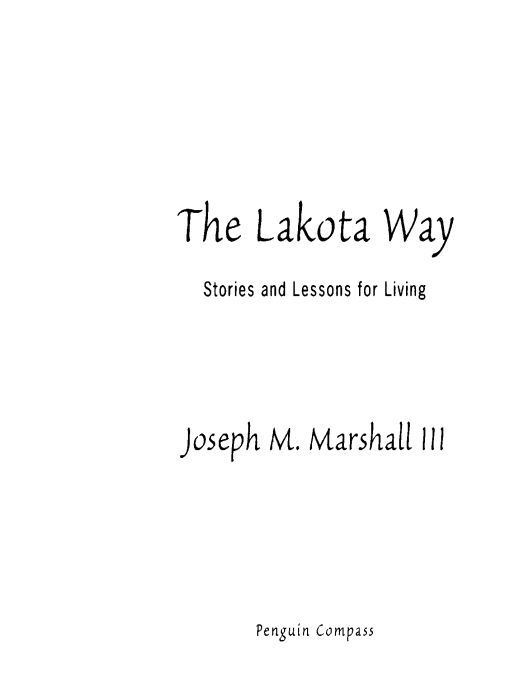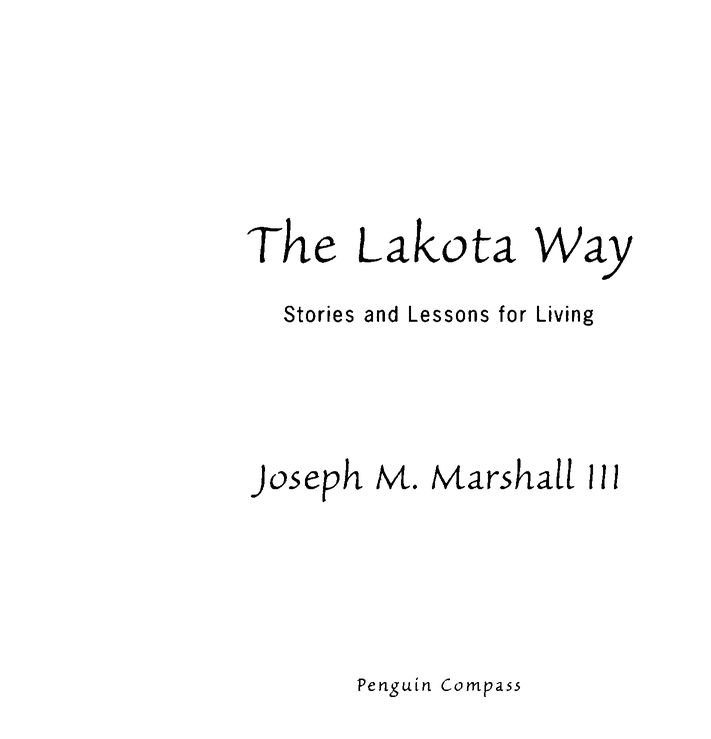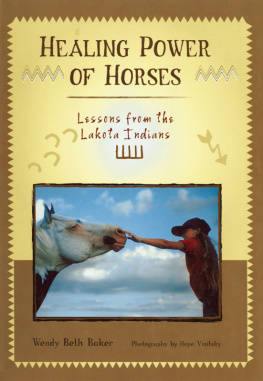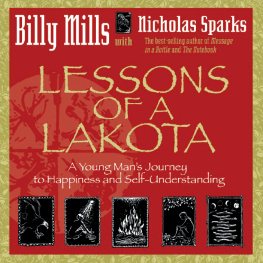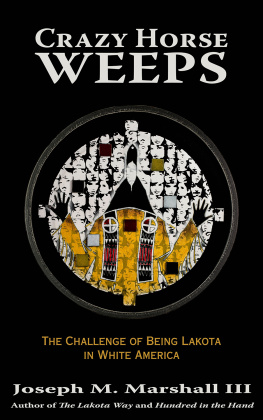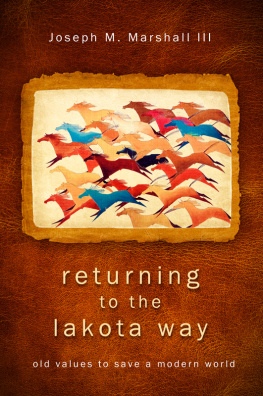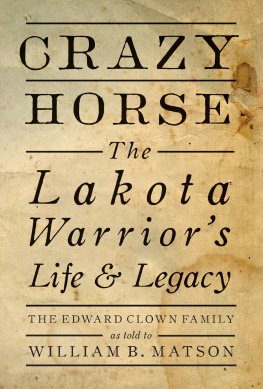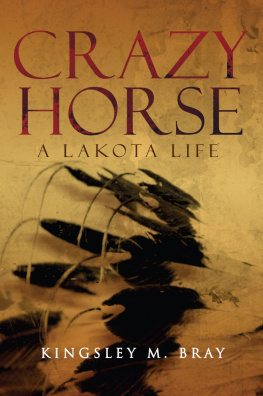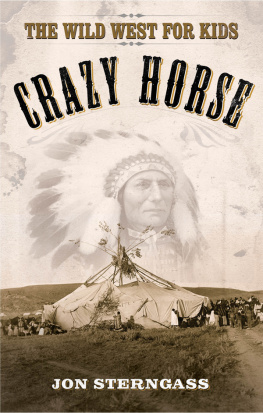Table of Contents
THE LAKOTA WAY
Joseph M. Marshall III was born on the Rosebud Indian Reservation in what is now south-central South Dakota. Marshall was raised by his maternal grandparents and his first language is Lakota. He is a historian, educator, and speaker, and he has been a technical adviser and actor in television movies, including Return to Lonesome Dove. A recipient of the Wyoming Humanities Award, he is the author of two collections of essays, On Behalf of the Wolf and the First Peoples and The Dance House, and a novel, Winter of the Holy Iron. He lives in Jackson Hole, Wyoming. For more information about Joseph Marshall, please visit www.thunderdreamers.com.
Praise forThe Lakota Way: Stories and Lessons for Living
It is rare to find a storyteller who is also a natural healer; a person concerned not just with the excitement a story might generate, but also carrying deep intuitions about how each story has a teaching essence enfolded in it. With gentle humor and fierce beliefs about conduct of life, Joseph Marshall places his personal and magical words just so into the human heart, reminding us all through the stirring of memory, that full capacity and beauty are still in each soul presently and irrevocably so. To cause memory; that has always been the real work of stories.
Clarissa Pinkola Ests, Ph.D., author of Women Who Run With the Wolves and La Curandera
A book of virtues, Sioux style, that puts the work of Allan Bloom and William Bennett to shame. Wise words by an authentic representative of Lakota culture ... add up to an inspirational book of a high order.
Kirkus Reviews
This is a Native Book of Virtues ... Joe Marshall opens the tipi flap and invites us all to enter, to enjoy customary Lakota hospitality, to listen and to learn. Will we have the wisdom this time to enter and sit quietly while the elders tell us their stories?
Roger Welsch, author of Old Tractors Never Die
Marshall beautifully imparts Lakota wisdom ... he certainly knows how to weave a story. An inspiring guide for a wide audience.
Library Journal
For Kimberly Jo Schmidt
1972-1989
Daughter, Granddaughter, Niece,
and Dreamer
Heres to your dreams.
and
Joseph N. Marshall II
1923-2001
Husband, Father, Grandfather, Great-grandfather,
and Inspiration.
Acknowledgments
Some time ago I learned that each of us is a sum of all the experiences we have had up to the present moment. Having said that I am suddenly struck by the fact that there isnt enough space to list by name all of those people who have made a contribution to who and what I am. Not to mention the numerous dogs and horses and various other non-two leggeds who have taught me a thing or two. Or, for that matter, the Earth itself. Needless to say I am grateful to all who have crossed my pathwhether you were a help or a hindrancebecause everything serves a purpose in the end.
So far as this work is concerned, I do have specific people to thank. My agent, Jody Rein, whose insight and heart and ingenuity were the first strong steps this project took. To my editor and publisher at Viking Penguin, Janet Goldstein, thank you for seeing the value in what I wanted to say. And to all the good folks at Viking Penguin who made this book a tangible offering.
There would be less meaning in this project were it not for my friends who stood by my family and me during difficult times, your caring and help mean more than you can imagine: Alan L. Dixon, Linda Watson, Everett and Antigoni Ladd, Bob Berky, David Kornbloom, Dr. Jerry Behrens, Dr. Tarver Bailey, Brenda Rogers, Angus and Mary Lou Morrison, Lessert and Alice Moore, Dr. H. Sterling Fenn, Gwen and Sylvan Markman, and Jeff and Lana Crabtree.
To my parents, Joseph Sr. and Hazel Marshall, thank you for all you taught me. When I grow up I want to be like you.
All of my grandparents deserve special recognition for thousands of reasons, but most especially for the stories they told and the stories they were themselves, but also for bringing into my life an awareness of others of their generation. All of them were exceedingly rich repositories of life, and stories. All of them are still alive in my heart and memory.
Patience is certainly a virtue and one not everyone learns, unless one has children. The occasional spurts of patience Im able to gather have been taught to me by Kira, Michael, William, Margeaux, Erin, Steven, Gabrielle, Alixandra, and Caitlin. I will always love you for those invaluable lessons. You always come to mind when Im able to outlast something or someone with just a little patience.
No one should travel lifes road alone, and I am immensely grateful that I do not. Without my strongest and constant supporter, my wife, Connie, anything I choose to undertake would be a much more difficult task. Any accomplishment or reward would be meaningless without you to share it with.
Finally, thanks to Wakantanka for making me a Lakota, for giving me a road of difficulty rather than a road of ease. Wopila heca yelo.
Mitakuye oyasin.
Introduction: Let the Wind Blow Through You
A playground dispute in the fourth grade concluded with a barrage of epithets hurled at me, each one more stinging than the one before. I was called every derogatory name for Indians that two white fourth-grade classmates could remember. Stunned, I could think of nothing equally hurtful to throw back.
That evening, still hurting from the insults, I told my grandfather about the incident.
Words can hurt, he said, but only if you let them. They called you bad names. Were you changed into the things they called you?
No, I replied.
You cannot forget what they said any more than you cannot feel the wind when it blows. But if you learn to let the wind blow through you, you will take away its power to blow you down. If you let the words pass through you, without letting them catch on your anger or pride, you will not feel them.
My grandfathers wise counsel has helped me through many storms in life. How his quiet, yet powerful comments influenced me, and still do, is one of my favorite stories. When I tell young people how my grandfathers words helped me, I can feel those words going into their hearts.
Stories and storytelling were all around me in my childhood. The storytellers were my Lakota grandparentsboth maternal and paternaland others of their generation. Strangely enough, these elders didnt seem old to me, but I did have a sense that theyd been around a long time and knew everything.
If the storytellers were old, their stories were much older. The Grandmas and Grandpas were the living repositories for all those wonderful stories told them by their elders from generations before. The stories I heard and learned provide lessons that I can apply in the present; but they also connect me to the pastto a way of life that has endured far longer than I can imagineand to the people who walked the land and left old trails to follow. And because I and others like me were, and are, hearing and remembering the stories, that way of life will remain viable through us..

